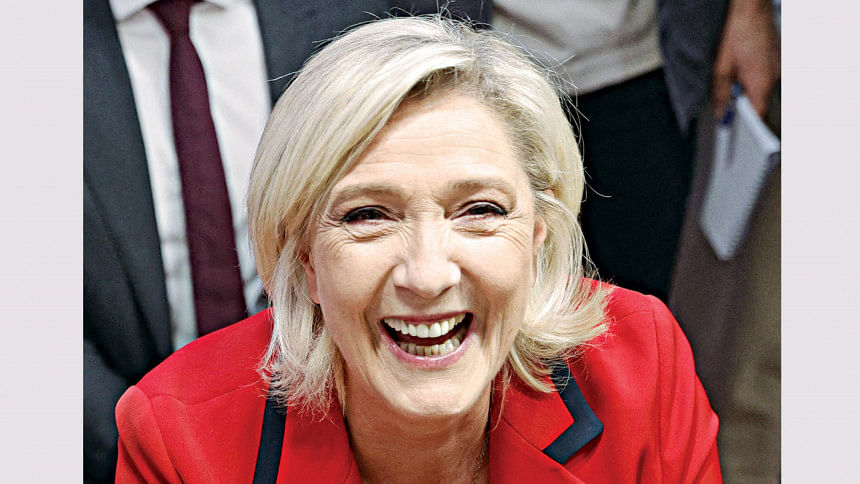French far right wins first round: exit polls
France’s far right won the first round of pivotal legislative elections yesterday with the centrist forces of President Emmanuel Macron coming in only third behind the left after the highest turnout in over four decades, estimates said.
But it remained unclear if the far-right National Rally (RN) party of Marine Le Pen would win an absolute majority of seats in the new National Assembly lower house in the July 7 second round and claim the post of prime minister.
Macron had stunned the nation and baffled even some allies by calling snap polls after the RN trounced his centrist forces in European Parliament elections this month.
That gamble risks backfiring, with Macron’s alliance now expected to win a far smaller minority contingent in parliament, making the president a far less powerful figure for the remaining three years of his term.
Projections from prominent French polling firms gave the RN 34.5 percent of the vote, compared to 28.5-29.1 percent for the left-wing New Popular Front alliance, and 20.5-21.5 percent for Macron’s centrist camp.
The polling agencies projected this would give the RN a majority of seats in the 577-seat National Assembly after the second round and a possible absolute majority.
In a statement, Macron called for a “broad” alliance against the far right in the second round.
Julien Martin, a 38-year-old architect, who voted in the southwestern city of Bordeaux, said: “These are not easy elections, the results are very uncertain, and the repercussions could be serious for society.”
With the French facing their most polarising choices in recent history, turnout soared. The Elabe organisation projecting a final turnout of 67.5 percent, the highest participation in a regular format legislative election in France since 1981.
The final turnout in 2022 was just 47.5 percent.
The July 7 second round will see run-off votes take place in seats where there was no absolute majority, allowing the final composition of the National Assembly to take shape.
With Russia’s war against Ukraine in its third year and energy and food prices much higher, support for the anti-immigration and eurosceptic RN party has surged despite Macron’s pledges to prevent its ascent.
The two-round vote could put the far-right in power in France for the first time since the Nazi occupation in World War II and give 28-year-old RN party chief Jordan Bardella, a protege of its longtime leader Marine Le Pen, the chance to form a government.
This would create a tense period of “cohabitation” with Macron, who has vowed to serve out his term until 2027. Bardella has said he will only form a government if the RN wins an absolute majority in the elections.
In the southern city of Marseille, Nabil Agueni said he had skipped the European elections but voted on yesterday.
“As long as we have a choice, it’s better to go and vote”, the 40-year-old said.
Nicole Cherprenet, a 79-year-old voter in Paris, added: “The future scares me.”
Some shopkeepers in major cities including Lyon and Rennes boarded up their storefronts in anticipation of possible riots, although there were no immediate reports of unrest.
Macron and his wife Brigitte cast their ballots in Le Touquet in northern France, with the 46-year-old president seen taking selfies and mingling with supporters.
A beaming Le Pen was seen hugging and kissing voters in Henin-Beaumont, the far-right stronghold in the north, where she is standing to be re-elected as an MP.
In the French Pacific territory of New Caledonia, where tensions remain high following deadly riots there last month, turnout stood at 60 percent compared to 32.5 percent recorded during legislative polls in 2022.
Mujtaba Rahman, Europe head at Eurasia Group, a risk consultancy, said turnout was key to the outcome of the election.
“The higher the turnout, the more candidates qualify,” he said on X.
He said that the left-wing alliance and Macron’s centrist camp would be able “to make deals to withdraw worst-placed candidates and allow the others a free run against the far right candidate” in the second round of voting.
Macron’s decision to call the snap vote plunged the country into political turmoil and sparked uncertainty in Europe’s second-biggest economy.
The Paris stock exchange suffered its biggest monthly decline in two years in June, dropping by 6.4 percent, according to figures released on Friday.
LondonGBDESK//



Comments are closed.